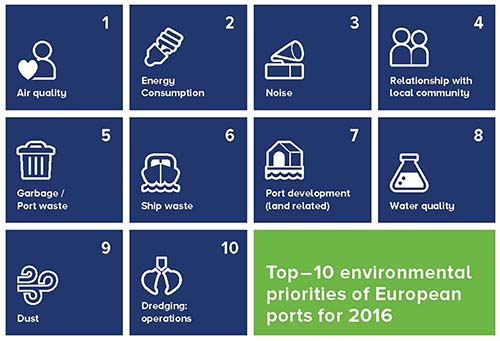Top 10 Environmental Priorities for E.U. Ports
The European Sea Ports Organisation (ESPO) has released the results of its recent environmental review during the PORTOPIA conference in Lisbon. As in 2013, air quality remains the number one priority of European ports.
The focus on air quality is in line with the priority given to the issue at E.U. political level with the implementation of the Sulphur Directive. The Directive stipulates that as of January 1, 2015, E.U. Member States have to ensure that ships in the Baltic, the North Sea and the English Channel are using fuels with a sulfur content of no more than 0.10 percent.

Overall, all the priorities of the 2013 top 10 remain in the top 10 of 2016. Energy consumption becomes the second priority issue of European ports. Since 2009, the importance of energy consumption has raised year over year. One of the reasons is the direct link between energy consumption and the carbon footprint of the ports and climate change.
Noise appears in number three and has remained a top priority issue since 2004.
Relationship with the local community climbs at number four and confirms again the acknowledgement of ports on this important topic. It is clear that ports grant their license to operate and to grow from their local communities.
Two waste items, port waste and ship waste, remain in the top 10 on the fifth and sixth position respectively. The climbing of water quality at number 8 can be linked with the implementation of the water framework directive and the ongoing discussions on the potential impact of washwater discharges by open loop scrubbers.
Port development (land), dredging operations, and dust are issues that have appeared consistently in the priority list of the European port sector over the last 20 years.
The aim of the review is to update the top 10 environmental priorities of European ports and to produce further benchmark figures in key areas of port environmental management.
“This data is important, as it identifies the high priority environmental issues on which ports are working and sets the framework for guidance and initiatives to be taken by ESPO,” says Antonis Michail, senior policy advisor and EcoPorts coordinator at ESPO.

that matters most
Get the latest maritime news delivered to your inbox daily.
Building on a long tradition that goes back to 1996, ESPO and EcoPorts regularly monitor the top environmental priorities of European ports authorities. The 2016 exercise builds on data from 91 ports in 20 E.U. Member States. The outcomes include further benchmark figures in key areas of port environmental management and trend analysis and are incorporated in the latest PORTOPIA Sustainability Report, released on March 23.
The report is available here.
